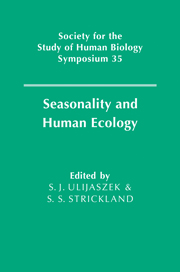Book contents
- Frontmatter
- Contents
- List of contributors
- Acknowledgements
- 1 Introduction
- 2 Seasonality and human biology
- 3 The influence of seasonality on hominid evolution
- 4 Environmental temperature and physiological function
- 5 Physiological responses to variations in daylength
- 6 Seasonality and fertility
- 7 Seasonality of reproductive performance in rural Gambia
- 8 Seasonal effects on physical growth and development
- 9 Seasonal variation in the birth prevalence of polygenic multifactorial diseases
- 10 Environment, season and infection
- 11 Seasonal mortality in the elderly
- 12 Nutritional seasonality: the dimensions of the problem
- 13 Seasonal variation in nutritional status of adults and children in rural Senegal
- 14 Culture, seasons and stress in two traditional African cultures (Massa and Mussey)
- 15 Agriculture, modernisation and seasonality
- 16 Seasonal organisation of work patterns
- Index
1 - Introduction
Published online by Cambridge University Press: 23 January 2010
- Frontmatter
- Contents
- List of contributors
- Acknowledgements
- 1 Introduction
- 2 Seasonality and human biology
- 3 The influence of seasonality on hominid evolution
- 4 Environmental temperature and physiological function
- 5 Physiological responses to variations in daylength
- 6 Seasonality and fertility
- 7 Seasonality of reproductive performance in rural Gambia
- 8 Seasonal effects on physical growth and development
- 9 Seasonal variation in the birth prevalence of polygenic multifactorial diseases
- 10 Environment, season and infection
- 11 Seasonal mortality in the elderly
- 12 Nutritional seasonality: the dimensions of the problem
- 13 Seasonal variation in nutritional status of adults and children in rural Senegal
- 14 Culture, seasons and stress in two traditional African cultures (Massa and Mussey)
- 15 Agriculture, modernisation and seasonality
- 16 Seasonal organisation of work patterns
- Index
Summary
Human ecology is the study of the interrelations that exist between individuals, populations, and the ecosystems of which they are a part, while seasonality has been defined as regular recurring intra-annual fluctuation of environments, and of the individuals and populations living in them. The appreciation of seasonality as a significant source of human variability has a considerable history, anthropologists in particular long having recognised the importance of season in the structuring of people's lives and of their work and ritual activities. However, it is only more recently that the effects of seasonality on a range of human functions and activities have been widely investigated.
The Society for the Study of Human Biology Symposium on Seasonality and Human Ecology, held on April 9–10, 1992 at the University of Cambridge, allowed the different ways in which seasonality influences human biology and behaviour to be examined in a systematic manner by human biologists, anthropologists, physiologists and nutritionists. The papers discussed at that meeting are published in this volume.
In the first contribution (Chapter 2), F.E. Johnston discusses the range of biological phenomena associated with seasonality and concludes that, as a species, humans are enormously responsive to the seasonal changes and environmental cycles that characterise their ecosystems. He argues that environmental seasonality is not so much a stress to which contemporary human populations must adapt, but rather a basic component of the ecosystems within which our ancestors evolved, one that has left its mark indelibly upon the makeup of our biology and behaviour.
- Type
- Chapter
- Information
- Seasonality and Human Ecology , pp. 1 - 4Publisher: Cambridge University PressPrint publication year: 1993

